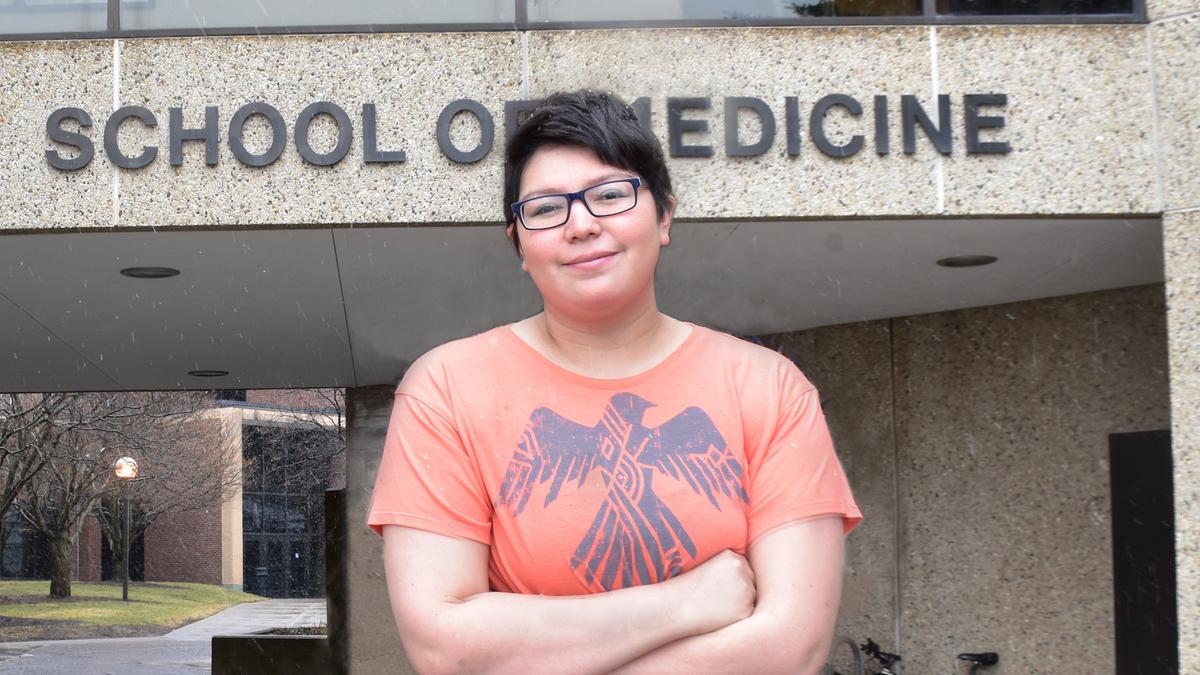In the fifth grade, UMD student Teague Goodsky took a field trip to Duluth, Minn. Her class watched a presentation on Native Americans. In the video, Native Americans were shooting bows and arrows and dancing around a campfire in their Native American attire. Some students watched with acceptance, but Teague and her American Indian classmates came back from the field trip confused.
Teague is a part of the Bois Forte Band of Minnesota Chippewa. “I knew I was Native American but when I saw the film, I thought maybe I’m not Native because I have never shot a bow or worn clothes like that,” Teague said. “It was very confusing seeing that mindset.” As a child, Teague saw white teachers and medical professionals, but outside of tribal leadership and tribal elders, she didn’t see American Indians in influential positions.
That confusing moment happened 20 years ago but Teague still carries the memory with her. It was part of her motivation to come back to UMD to study medicine.
At UMD to Achieve
Teague is back in Duluth after earning an undergraduate degree in English from the University of Minnesota Morris. She’s proud of her degree because it opened up doors for her, but it's not where she wants to finish. Teague’s goal is to become a physician and practice in her Native community.
To achieve her dream, she has enrolled at UMD as a non-traditional student and is taking prerequisites to enroll in medical school. She also works as the program coordinator for the Center for American Indian and Minority Health at the University of Minnesota Medical School Duluth Campus.
Maintaining the Ojibwe Language
Teague speaks the Ojibwe Language, Anishinaabemowin. It will serve her in the future when she practices medicine. She enjoyed an opportunity in February 2019 to visit a language camp.
“It was great to speak the language and meet family members,” Teague said. “We had sled dog races, traditional games, and lots of food. Those events are refreshing, and I come out of them ready to move forward.”
Teague explains that the Ojibwe language is at a stage of revitalization. The language was lost when Native children were sent to boarding schools. Native elders were afraid to speak Ojibwe, and they were actively suppressed from speaking the language.
“A part of the camp’s purpose is trying to rekindle that fire again,” Teague said.
The Importance of Role Models
Teague was determined to follow her passion to become a physician, even though there were no role models for her. In fact, there aren't many Native doctors at all. According to the Association of American Indian Physicians, 18,000 students graduated from medical school in 2015, but only 20 were American Indian.
“It's discouraging when you’re in grade school and you have to write an essay about who you look up to and you just sit there and not having someone to write about,” Teague said. “It does a lot for Native children to see role models for themselves. You want to see people that look like you who are thriving and succeeding.”
Teague has already started to be active in her community through a tutoring program at Denfeld High School. Her mission is to help students graduate. She says the graduation rate for Native American students is extremely low. According to a Duluth News Tribune article, it was 55 percent in Duluth in 2017. The rate has steadily been increasing, though. In 2015, the graduation rate was 30 percent for Native students.
Tutoring is important to Teague. “Having knowledge is a critical aspect of self esteem,” Teague says. “If you know things and feel competent in the world, you’re able to carry yourself confidently.”
The Road Ahead
Teague’s next step is medical school. After that, a residency and eventually a position as a physician for a Minnesota tribe.
Her goal is not just for herself, it’s for the students who come after her. “I want to be a positive asset in my community,” she says. But there’s more to it. “I want to help young people realize that you don't have to be super smart to go to medical school,” Teague says. “You need some amount of determination and consistency, and you just have to want to be a physician.”
